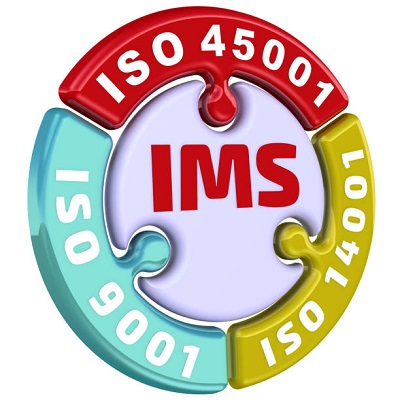
IMS - ISO 9001:2015, ISO 14001:2015 And ISO 45001:2018
An Integrated Management System (IMS) combines all aspects of an organisation's systems, processes and Standards into one smart system. This merger allows a business to streamline its management, save time and increase efficiency by addressing all elements of the management system as a whole.
An Integrated Management System (IMS) integrates all of an organization's systems and processes into one complete framework, enabling an organization to work as a single unit with unified objectives.
Policy & Commitment
The organization must prepare an effective policy that provides a clear direction for the organization; a commitment to continuous improvement along with compliance to regulatory agencies and customer requirements.
Planning
An effective management structure and defined activities should be put in place to provide deliverable of their company policy. This is accomplished through objectives and targets that are developed for all managers and employees.
Implimentation & Operation
For effective implementation, the organization should provide the mechanisms necessary to achieve its policy, objectives and targets. All members of the workforce should be encouraged, empowered and engaged in the management system and all facets of the organizations process and production stages.
Hazard Identification & Control
Wherever possible, risks to the business and the organization should be identified and eliminated through the selection and design of equipment, processes and facilities.
Education & Training
Employees need to know about the risks and threats to their industry and organization and how to control their exposure. The best way for them to gain this knowledge is through education and training.
Evaluating Performance
A successful IMS is one that is able to effectively measure, monitor and evaluate its performance. Performance can be measured against standards to reveal when and where improvement is needed. Active self-monitoring through periodic assessments, inspections and observations reveals how effectively the IMS management system is or is not functioning.
In conclusion, all IMS’s are based on the same fundamental concepts :
- Process management and control : ensure that processes deliver the intended results and that applicable requirements are complied with.
- Plan-Do-Check-Act approach to management and process control : establish objectives, define the processes needed, monitor progress and compliance, take action where necessary, and consider improvement opportunities. An integrated management system enables an organization to carefully examine what they do, define and implement improvements and continuously review and manage systems and processes.
PLAN – Plan the safety management system.
DO – Implement the safety management system.
CHECK – Evaluate the safety management system.
ACT – Improve the safety management system.
Risk Management :
Identify the risks that provide threats and opportunities, and implement controls to minimize negative effects on performance and maximize potential benefits.
Services
Safety Audits As Per IS 14489:2018
Quantitative Risk Assessment Studies
Maximum Credible Loss Scenario (MCLS)
Safety Integrity Level Studies
Emergency Response Disaster Management Plan (ERDMP)
Environmental Impact Assessment
SIMOPS Workshop And Preparation Of SIMOPS Procedure
Fire Audit And Adequacy Survey
